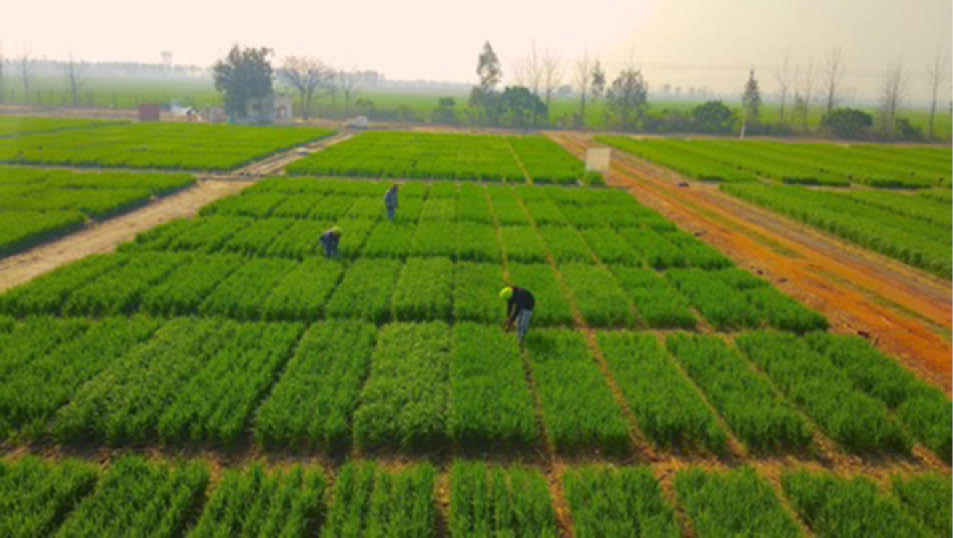Irrigation farming in rural communities in Niger State is progressively becoming more popular during the dry season than it has ever been, despite government support for raising farmer output being nonexistent.
Although the rain-fed harvest has barely ended, farmers said they are clearing additional hectares of land for dry season farming as the food crisis worsens.
However, despite the state and federal government’s claim of strong support for farmers, access to subsidised farm inputs, according to rural farmers, continues to be the biggest obstacle. They further noted that subsidised inputs end up in the hands of a small number of “political farmers,” rather than reaching the majority of farmers who live on the farm.
In October 2023, the Niger State governor, Mohammed Umaru Bago flagged off the 2023 wet season sales and distribution of NPK and Urea fertilisers as well as chemicals at the subsidised rate to small-scale farmers in the state.
FG, Abu Dhabi govt parley on supply of 14,000 Nigerian artisans
Fountain University records breakthrough in early cervical cancer diagnosis
Flagging off the sales and distribution at the Minna Farm Centre, Governor Bago said each interested farmer should not be allowed to purchase more than 10 bags, warning to deal with anyone found diverting the commodity.
He said 60,000 bags of the fertilisers were already on the ground for distribution, adding that another 120,000 bags would be provided.
But despite the governor’s warning, the small-scale farmers were eventually schemed out, according to rural farmers who spoke with Daily Trust correspondent.
Farmers told Daily Trust that irrigation farming remains the only way out of the current food crisis, saying that all-year-round farming will make food more available to meet the market demand.
An irrigation farmer in Wushishi, Wushishi LGA of Niger State, Bala Mahmud Egge told our correspondent that he cultivates rice, maize, okra and cucumber and other crops three times a year.
“While we have fully engaged in irrigation farming, we have serious challenges. First is the issue of herders who constantly encroach on our farmlands and eat up our crops. They do it day and night, and this is discouraging many farmers. We have called on authorities several times to intervene but the challenge has continued unabated.
“Secondly, the high cost of fuel is pushing many farmers out of irrigation farming. We buy fuel to pump water using our personal water pumping machines. There are sources of water to use but the cost of fueling the pumping machine is very challenging.
“Another challenge is the lack of access to quality and subsidised farm inputs such as fertilisers and chemicals. Most of the inputs the government sells don’t get to the real farmers. We buy directly at the market at a higher price.” He said.
Similarly, farmers in Gbako Gbako LGA of the state said they were into massive production of rice and cassava this dry season using artificial water control channels.
In Edozhigi Community, one of the major rice farming communities in Gbako LGA, farmers said they had not gotten any support from either federal or state government despite the repeated flooding that ravaged their rice, maize and sugarcane farms in 2021, 2022 and 2023.
One of the farmers, Tauheed Dwale told Daily Trust “Right now some rice is due for harvesting while some are currently at the flowering stage. We are also planting more because the variety we use is due for harvesting in three months. But we don’t get any support from governments at all levels. For the past three years, we have lost many hectares of our rice farms during flooding and despite our outcries, no support has come from the government. We spend hugely in buying fuel to pump water to our farms. Fertilizers and other inputs are of high cost. We have to take loans with high-interest rates to buy inputs. But, we thank God, irrigation farming is paying off.”
Farmers in rural areas in the state said they buy petrol from black marketers between N900 and N1,000 per litre due to the difficulty in accessing fueling stations.
In August 2023, the Head of the Minna Operations Office of NEMA, Hajiya Zainab Saidu told our ocrrespondent that the distribution of relief support approved by former President Muhammadu Buhari for the victims of the 2022 flooding was ongoing, but farmers whose large hectares of farms were destroyed said they were yet to receive the support.
Calls put across her this time went unanswered. She did not also reply to a text sent to her phone to establish why the relief materials were yet to get the real victims one year after.
Findings in various markets in the state showed a stable rise in the prices of food items.
As of last week, red beans were sold between N59, 000 and N63, 000 while white beans were between N58, 000 and N60, 000 a bag.




